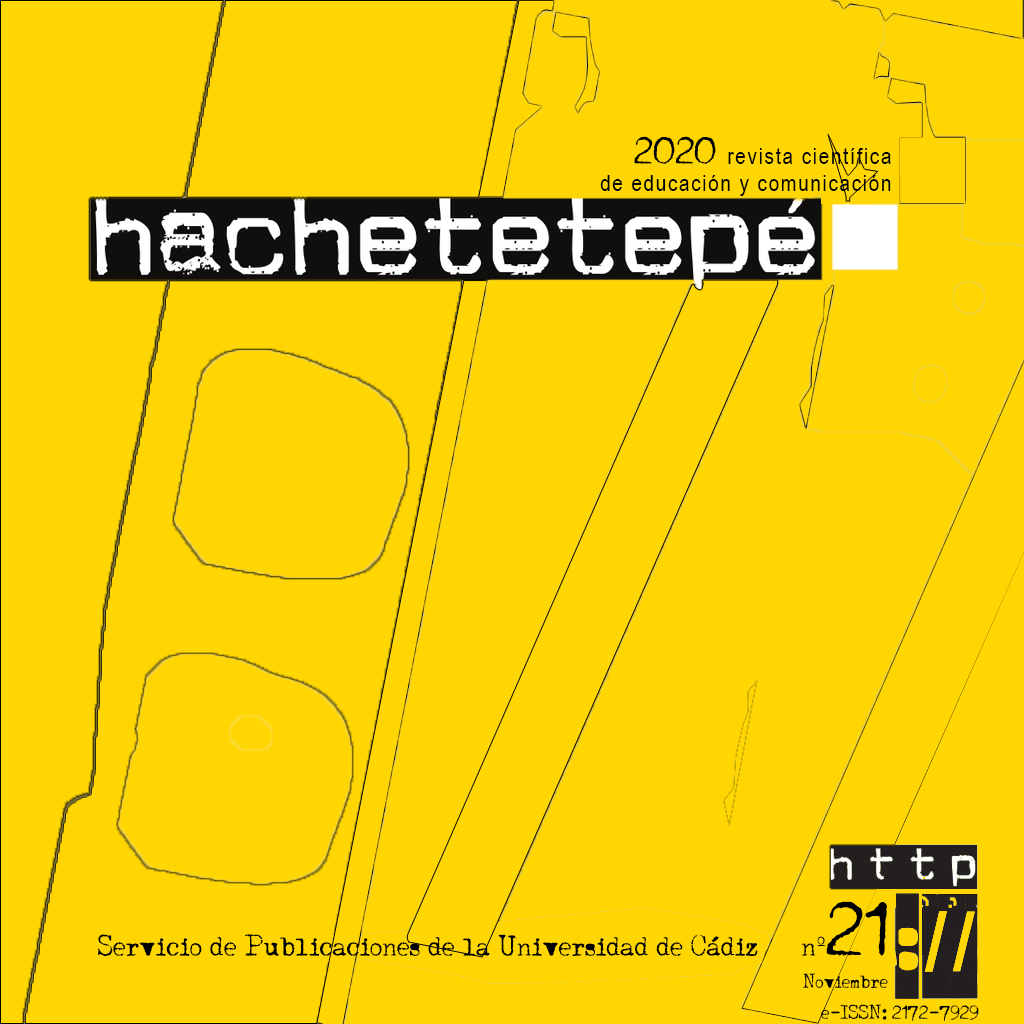Narratives in focus: the setting agenda and the public effects of the news on the prisoner's figure

Downloads
DOI
https://doi.org/10.25267/Hachetetepe.2020.i21.3Info
Abstract
This article focuses on the construction of narratives about the public effects of the figure of the prisoner disseminated or themed in the construction of journalistic narratives, in casu, made by Jornal do Tocantins. To this end, we proceeded with the collection of data for the robustness of the discussions, which was carried out through an online survey that took place with the application of a questionnaire directed on a digital platform, which brought up issues involving the great researched topic (Agenda Setting and trapped population). Therefore, it is clear that this is a qualitative research based on specific literature and / or in-depth studies by Maxwell E. McCombs and Donald L. Shaw and others that converge to update the discussion for the locus of pretension (Tocantins prison environment). The conclusions reached with force in empirical data raised even though they deal with sufficiency of the subject or central theme, making it possible to understand and comprehend in a broader way the effects of Agenda Setting theorizations in a prison environment and in the formation of public opinion.
Keywords
Downloads
How to Cite
License
Copyright (c) 2020 Francisco Gilson Rebouças Porto Junior, Giliarde Albuquerque Cavalcante Virgulino Ribeiro Nascimento

This work is licensed under a Creative Commons Attribution-NonCommercial-NoDerivatives 4.0 International License.
Those authors who have published with this journal, accept the following terms:
- They will retain their copyright and guarantee the journal the right to first publication of their work, which will simultaneously be subject to the Creative Commons Attribution License . They may be copied, used, disseminated, transmitted and publicly displayed, provided that the authorship, url, and magazine are cited, and are not used for commercial purposes. No derivative works are allowed.
- They may adopt other non-exclusive license agreements for the distribution of the published version of the work (e.g., deposit it in an institutional telematic archive or publish it in a monographic volume) provided that the initial publication in this journal is indicated.
- Disseminate your work through the Internet (e.g., in institutional telematic archives or on your website) once the manuscript is accepted, which may lead to interesting exchanges and increased citations of the published work. (See The effect of open access).
Hachetetepé. Scientific journal of education and communication does not charge a fee for the submission of manuscripts or for the publication of its articles.
References
Araújo, C. A. (2008). A pesquisa norte-americana. En A. Hohlfeldt, L.C. Martino, y V.V. França, Teorias da Comunicação (pp. 119-130). Petrópolis: Vozes.
Alonso, L. S. (2016). O corpus documental em história oral: teoria, experiência e transcriação. Revista Observatório, 2(1), 54-75. https://doi.org/10.20873/uft.2447-4266.2016v2n1p54.
Almeida, J. R. (2016). História e oralidade nos estudos comunicacionais. Revista Observatório, 2(2), 47-58. https://doi.org/10.20873/uft.2447-4266.2016v2especial1p47.
Assembleia Legislativa do Tocantins. (2017). Diário Oficial, Ano XXVI, nº 2427 (pp. 3-4). Disponible en: http://al.to.leg.br/diario.
Barros Filho, C. (1995). Ética na comunicação: da informação ao receptor. São Paulo: Summus.
Bitencourt, C. R. (2016). Tratado de Direito Penal: parte geral. 12ª ed. São Paulo: Saraiva.
Demo, P. (1994). Pesquisa e construção de conhecimento: metodologia científica no caminho de Habermas. Rio de Janeiro: Tempo Brasileiro.
Ferreira, G. (2000). Aplicação da Pena. Rio de Janeiro: Forense.
Formiga, F. O. N. (2006). A Evolução da Hipótese de Agenda-setting. Disponible en: http://livros01.livrosgratis.com.br/cp049726.pdf.
Foucault, M. (1975). Vigiar e punir: nascimento das prisões. Trad. Ramalhete, R. Petrópolis: Vozes.
Gerhardt, T. E. y Silveira, D. T. (2009). Métodos de pesquisa. Porto Alegre: Editora da UFRGS.
Gil, A. C. (1991). Como elaborar projetos de pesquisa. São Paulo: Atlas.
Lippman, W. (2008). Opinião pública. Petrópolis: Vozes.
Luo, Y. (2011). The internet and politics in China: the agenda-setting influence of online public opinion on media coverage and government policy. Disponible en: https://ijoc.org/index.php/ijoc/article/view/2257/1133.
Martinez, M. (2016). Reflexões sobre Jornalismo e História Oral: um campo com mais convergências do que dissonâncias. Revista
Observatório, 2(1), 75-91. https://doi.org/10.20873/uft.2447-4266.2016v2n1p76.
Martino, L. M. S. (2010). Teoria da Comunicação: ideias, conceitos e métodos. Petrópolis: Editora Vozes.
Mccombs, M. (2004). A teoria da agenda: a mídia e a opinião pública. Petrópolis: Vozes.
Mccombs, M., y Shaw, D. (1972). The agenda-setting function of mass media (pp. 176-182). Public Opinion Quaterly.
Miotto, A. B. (2020). O direito penitenciário: importância e necessidade do seu estudo. Disponible en: http://www2.senado.leg.br .
Mirabete, J. F. (1996). Execução Penal: comentários à Lei, n. 7.210. São Paulo: Atlas.
Melo, A. S. E. (2017). Enquadramento histórico legal do processo de Bolonha e o seu impacto no sistema de ensino superior português. Revista Observatório, 3(6), 75-141. https://doi.org/10.20873/uft.2447-4266.2017v3n6p75.
Moio, I., Alcoforado, L. y Vieira, C. C. (2017). A declaração de Bolonha e o reforço da abertura do ensino superior a novos públicos: perceções de pessoas adultas que frequentam a Universidade de Coimbra. Revista Observatório, 3(6), 169-201. https://doi.org/10.20873/uft.2447-4266.2017v3n6p169.
Nunes, S. G., Porto Junior, F. G. R. y Moraes, N. R. de. (2017). Conhecimento e organização: indicativos pós-Bolonha de uma sociedade em construção. Revista Observatório, 3(6), 338-353. https://doi.org/10.20873/uft.2447-4266.2017v3n6p338.
Oliveira, E. (1997). Política criminal e alternativas à prisão. Rio de Janeiro: Forense.
Porto Junior, F. G. R. y Moraes, N. R. de. (2017). Formando pesquisadores pós-bolonha em portugal: relações entre a formação de graduação e o campo da pesquisa/investigação. Revista Observatório, 3(6), 202-228. https://doi.org/10.20873/uft.2447-4266.2017v3n6p202.
Reis, E. G. dos. (2017). O ensino superior em cabo verde e os desafios do processo de Bolonha. Revista Observatório, 3(6), 142-168. https://doi.org/10.20873/uft.2447-4266.2017v3n6p142.
Rovai, M. G. de O. (2017). HISTÓRIA PÚBLICA: a comunicação e a educação histórica. Revista Observatório, 3(2), 41-65. https://doi.org/10.20873/uft.2447-4266.2017v3n2p41.
Secretaria de Cidadania e Justiça do Tocantins. (2018). Relatório de Gestão. Disponible en: https://central3.to.gov.br/arquivo/406567/ .
Secretaria de Cidadania e Justiça do Tocantins. (2018). Relatório com controle da População Carcerária. Disponible en: https://cidadaniaejustica.to.gov.br/institucional/institucional/relatorio-de-gestao-/.
Secretaria de Cidadania e Justiça do Tocantins. (2017). Plano de Adequação do Sistema Penitenciário do Tocantins. Disponible en: https://www.cge.to.gov.br/relatorios/prestacao-de-contas/relatorios-de-prestacao-de-contas-2017/secretaria-da-cidadania-e-justica---seciju-2017/secretaria-da-cidadania-e-justica---seciju-2017/.
Wolf, M. (2002). Teorias da Comunicação. Lisboa: Editora Presença.






